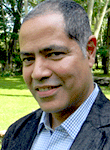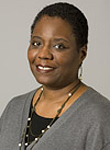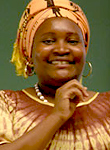Africana announces new curriculum and expanded faculty
By Linda B. Glaser



The Africana Studies and Research Center has announced a new curriculum and that its faculty will grow by 25 percent. On July 1, a full professor, new associate professor and a Swahili instructor will join the center.
As announced May 10, Gerard Aching, M.A. '90, Ph.D. '91, professor of Spanish and French literature, will join the Africana faculty July 1. In addition, Noliwe Rooks, associate director of the Center for African American Studies at Princeton University and the founding coordinator of the center's urban education reform initiative, also become part of Africana as an associate professor. Happiness Bulugu will join Africana as Swahili language lecturer. She has an M.A. in linguistics with a language teaching specialization from the University of Oregon, where she currently teaches.
A member of the graduate field of African and African-American studies, Aching will move 50 percent of his appointment to Africana July 1, after receiving the unanimous support of the current Africana faculty. July 1 also marks the beginning of his three-year term as director of Africana.
"I feel fortunate to have the opportunity to participate in this type of faculty-led department, with its abundant talent and commitment to original scholarship," said Aching.
Rooks studies class and gender within African-American history and culture. Her books include the award-winning "Hair Raising: Beauty, Culture and African American Women" and "White Money/Black Power," about the emergence and development of African-American studies programs. Rooks also works with students to address pressing social problems through social entrepreneurship, facilitates research-based collaborations between campus units and community partners, and raises awareness of the centrality of race to and for a liberal arts education. She received her Ph.D. in American studies from the University of Iowa in 1994.
In addition, this year has been a turning point for advancing the curriculum. The undergraduate major and minor requirements have been revised and the honors program clarified and standardized. The changes align Africana's program with other majors in the humanities and social sciences at Cornell and with Africana studies majors at peer institutions.
The revisions demonstrate "how actively we are involved in advancing the development of Africana studies philosophically, theoretically and pedagogically toward yet new directions and new horizons in academia," said Associate Professor Riché Richardson, who played a critical role in developing the curriculum changes over the past two years.
To develop Africana's new curriculum, Richardson said she examined the curricula at a range of departments in black and Africana studies around the nation and worked closely with faculty and lecturers.
The new curriculum will include an interdisciplinary introductory course (open to all students but required of majors) and three core courses in the department's foundational areas of African, African-American and Caribbean studies to provide geographic breadth. Following the foundational courses, majors will focus specifically on a theme or themes within or across core areas.
"The changes will bring greater coherence to our major, so that students will be able to gain some breadth in our core areas while also developing depth within a particular focus, such as popular culture, gender studies, history or literature," said Professor Robert Harris, who served as director of undergraduate studies this year, adding that it will also provide more options for students to develop a minor concentration in Africana studies.
This past year also saw significant progress toward establishing a Ph.D. program; a Ph.D. Committee has been formed and will submit a proposal to the Graduate School during the 2012-13 academic year.
Linda B. Glaser is staff writer for the College of Arts and Sciences.
Media Contact
Get Cornell news delivered right to your inbox.
Subscribe